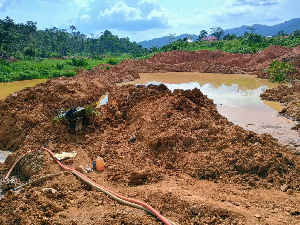Ghana on Tuesday launched the preparation of her third National Communication (NC3) to the United Nations Framework Convention on Climate Change (UNFCCC), a copy of which would be deposited at the UN Secretariat for reference.
Although the strategy was the third to be developed, people are still ignorant about its details and effect, because it failed to communicate issues concerning the impact of climate change to effect attitudinal change towards the environment.
Mr. Daniel Amlalo, Acting Executive Director, EPA, said the NC3, would become a reference document to serve as the basis for future intervention for the Ministry of Environment, Science and Technology (MEST) and the Environmental Protection Agency (EPA) on policies bordering climate change.
He was addressing stakeholders at the inception workshop of the NC3 organised by the EPA and launched a Project Baseline Mapping of the project.
Participants included representatives from ABANTU for Development, MEST, EPA, DFID and NADMO and civil society organisations.
Mr. Amlalo explained that the EPA under the auspices of MEST had undertaken various initiatives since the completion of Ghana’s Second National Communication which included implementation of the Africa Adaptation Programme which focused mainly on early warning systems, climate change and human health with emphasis on improving climate resilience of the health sector.
He mentioned other initiatives such as the development of National Climate Change Adaptation Strategy (NCCAS) and Climate Change and Information and Communication Technology (ICT), as all efforts towards mitigating the effect of climate change to safeguard food security, minimize disasters as well as negative health implications.
Mr. Amlalo explained that the EPA received financial support from the United Nations Environmental Programme (UNEP) to commence the preparation of the NC3, to avoid any gap in reporting to the UNFCCC, and to meet Ghana’s commitment to Articles 4 and 12 of the UN Convention on Climate Change.
“Because national communications are continuous nationally driven reporting mechanism, it is important that stakeholders like you are brought fully on board at the various stages of its preparation and tailor it to be relevant to national development.”
He said it was expected that whatever was captured in the NC3 would be incorporated into the development planning of the country for the next three years.
Mr. George Manful, Senior Task Manager, UNEP, said it was of the view that a better understanding of the problems of climate change and its complexities would enable Ghana avoid some of the adverse impacts of climate change and at the same time direct efforts wisely and find good opportunities to better adapt to climate change.
He stated that to date, climate policy had been largely in the hands of scientists and environmental activists, but it was time to mobilise all stakeholders including business and political leaders to address the issue in a more comprehensive manner.
“It is therefore imperative that adequate and sustained capacity is built at the individual, institutional and systemic levels to enable the country develop technological and policy alternatives to help address these problems,” he said.**
Regional News of Tuesday, 29 May 2012
Source: GNA












